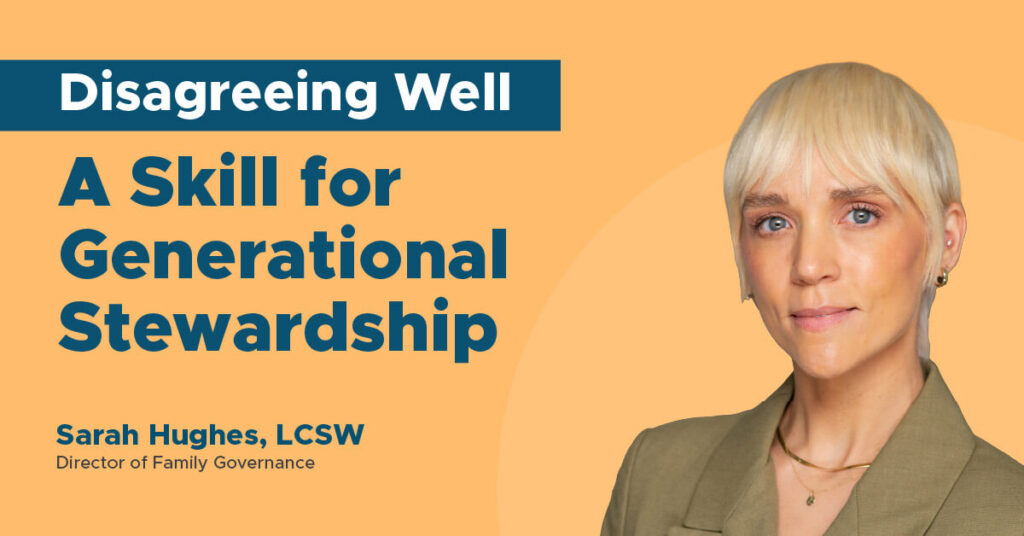
By Sarah Hughes, LCSW, Director of Family Governance
In families of significant wealth, disagreement is not only inevitable—it’s essential. I encourage my clients to see differing views across generations, branches, and roles as signs of vitality, not dysfunction. But the way we disagree can either strengthen family cohesion or quietly erode trust. The art of “disagreeing well” is therefore a foundational competency for long-term family unity and effective governance.
I teach a skills-based, compassionate framework for navigating disagreement that helps family members achieve more clarity. At its heart, we’re inviting folks to move beyond blame or defensiveness toward mutual understanding through four simple steps: observations, feelings, needs, and requests.
Consider this scenario where there is uneven engagement with the family office among adult inheritors. A typical argument might go like this:
Sibling A: “I’m doing all the work with the advisors while you just collect the checks and criticize everything.”
Sibling B: “Well, not everyone wants to make this their full-time job. You’re the one who acts like you run the show.”
Using the framework I coach, family members learn to adjust how they express concerns and needs in a non-blaming way:
Sibling A: “I’ve noticed I’ve been the one attending most of the meetings with the family office (observation). I feel overwhelmed and sometimes resentful because I need more shared responsibility and collaboration (feelings and needs). Would you be willing to talk about how we can divide some of the tasks more evenly—or at least check in regularly as a team (request)?”
Sibling B: “I’m feeling a bit defensive when this comes up, because I don’t feel confident in my knowledge, and I sometimes feel judged (feeling). I need more understanding and support before I can participate more (need). Could we start with a few basic updates or a learning session first so I can get up to speed without feeling like I am behind (request)?”
You can see that this is not about avoiding conflict, it’s about engaging it skillfully. Disagreeing well doesn’t require us to suppress our convictions or feelings. Instead, it asks us to articulate them in a way that invites connection rather than disconnection.
For families stewarding wealth across generations, learning to disagree with empathy and care is not just a communication technique, it’s a form of resilience. It allows space for difference without threat. And over time, it builds a culture where trust, accountability, and shared purpose can flourish—even in the face of hard conversations.
Key Takeaways for Families:
- Embrace disagreement as part of a healthy decision-making culture
- Use four steps: observation, feeling, need, and request
- Focus on connection over persuasion
- Train next-gen leaders in communication as a governance competency
In the end, how we disagree determines whether our legacy divides or unites. Practice skillful dialogue not just for harmony today, but to set a standard of understanding and respect for future generations.
About Cresset
Cresset is an independent, award-winning multi-family office and private investment firm with more than $237 billion in assets under management and advisement (as of 1/1/26). Cresset serves the unique needs of entrepreneurs, CEO founders, wealth creators, executives, and partners, as well as high-net-worth and multi-generational families. Our goal is to deliver a new paradigm for wealth management, giving you time to pursue what matters to you most.
https://cressetcapital.com/disclosures/
